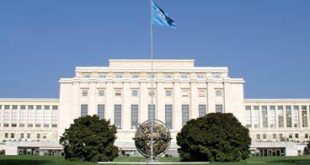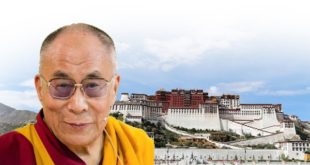at the 9th UBCV Congress, Westminster, California
20th November 2011
Good Morning Everyone,
I would like to start by thanking Vo Van Ai and the Unified Buddhist Church of Vietnam (UBCV) for organizing this event and inviting me to talk to you today.
My name is Sherif Mansour. I am an Egyptian democracy and human rights activist. I worked in Egypt with several Egyptian civil society organizations including the Ibn Khaldun Center, which was the pioneer human rights organization in the Middle East region started in 1988, and I founded the Egyptian Association for Change in the United States, an Egyptian Diaspora organization that mobilized Egyptians abroad to support the Egyptian revolution. Currently I work for Freedom House, an international non-governmental organization working to promote freedom worldwide, and I continue to work closely with youth activists in Egypt, including the April 6th youth group and other Facebook organizers.
I was asked to talk to you today about the dynamics of the Egyptian revolution. Given that you are already in this hall, I am sure that you are interested in seeing a similar transition in your own country. You already know that your country deserves better; that your people yearn for their Freedom; and that they want their rights. Most importantly, it is only a matter of time before they get both.
But what you might need to achieve both, and what I think I can help with, is a vision of how to get there faster. Of course there are no simple answers; no single, “cookie-cutter” approach that works across all countries. But there are important principles and lessons learned from history that we can draw from, and most importantly, as the case of Egypt shows, absolutely ANY country can experience this kind of change. Egypt was considered to be the “Stable” giant in the Middle East, and few experts predicted the events of January 25th 2011.
When the Tunisian revolution happened in January 2011, all the other dictators in the region said “we are not Tunisia”. But the people of the Middle East disagreed. Even though they had always been accused of being “cultural and religiously” immune to freedom (according to “Experts” in the West and in the region) and for somehow having religions or historical traditions that were “incompatible” with democracy, the people of the region have defied these stereotypes. All humans yearn for freedom and want their basic human rights to be protected. There are no exceptions. None.
I will try to speak briefly about 5 principles and lessons learned from the Egyptian revolution in my 10 minute talk. But I will be happy to elaborate on them later in the discussions.
First: “focus on what you and your movement can do, not what your oppressor does”. It is easy to curse darkness, but much more useful to light candles. The regime can put out one candle or more. But if the light is bright enough, their eyes will be blurred and their hands will be shaken. They can crush the followers but they cannot stop the spring. This was a major obstacle for Egyptians prior to January 25th. Many Egyptians activists were too focused on what Mubarak was doing and not doing to promote reforms, rather than focusing on what they themselves could control and how they could force him to cooperate.
Second: Vision and strategy. Before a movement can build, leaders need to articulate and define their vision; in other words, what is the alternative they are offering the people? You then have to plan and build your movement’s strategy to achieve that vision. You need to define your weakness and strength. And most importantly, you need to build your track record of success. You want to show you are a winner; that people can trust you to follow through on your word. You want to have a good media tool-kit in your pocket. Social media was and still is the “glitch in the system” upon which activists in Egypt found space to talk and organize. You may have other tools, including your religion, and your social networks.
At the same time, look into your history and you will find those moments of success—however small or large—that you can build from in the present. Look into your traditions and strengthen those elements of revolt and defiance and support for truth, justice and dignity. Build on those, no matter how small they are and you will create your confidence and legitimacy with your people.
In the case of Egypt, the unifying issue was police brutality. No matter what someone’s class, gender, religion, or political views, all Egyptians had experienced or seen police brutality in Egypt go unchecked for thirty years. This was the one issue that activists could use to bring in the majority of Egyptians to their cause. It was the link between what “democracy means in the abstract” and how it relates to the lives of ordinary Egyptians. Similarly, you need to find your local, indigenous, and original issues to raise and mobilize with your people. No one else can find that for you.
One of the most effective tools Egyptian activists used to overcome the fear barrier was humor. In the region, Egyptians are known for their sense of humor. Activists took this and turned it against the regime. For example, during the uprising in 2011, activists who were tired of waiting for Mubarak to resign, had signs that said “go away my arms are getting tired” or activists would collect trash from people in Tahrir and instead of asking for trash they would ask for their “Mubaraks”.
Third: It is a numbers game. As one of our inspiring leaders, Dr. Mohamed Elbaradei, always, reminded us throughout the last year, “Your strength is in your numbers”. No regime, no matter how brutal can jail its entire population. They need the people to obey them or at least tolerate them to be able to survive. The power, then, is shared, among 90 million people, in the case of Vietnam.
My experience working with Egyptians inside and outside the country proves that your greatest obstacles to getting the numbers you need to create a critical mass are fear and cynicism. Fear is what makes people reluctant to express their opinions and that allows oppression to exist and prevail. Cynicism makes people reluctant to act and pull their strengths together. If both can be overcome, no regime in the world can stop you.
The antidote for fear is clear. Hope. If you can dream and make your people believe in your dream. And if you can create an alternative regime or leadership that they can trust, and can believe they can bring this dream to reality, you are half the way there. I remember one of the early slogans of the revolution was “be realistic and seek the impossible”. It is not idealistic to dream. It is very realistic, if you look at from the oppressor’s perspective. They are the one afraid, that why they jail their people, and torture them, and force them out of the country. In fact, it is always a handful of dreamers who change history. They could be very much in this room. They just need to “believe” in their ability, and have confidence that history is on their side.
You will always make mistakes and will probably face increasing difficulties along the way. You will have failures. But those are the reason why you will become more successful. The “day of anger in Egypt” which was chosen to be January 25, the first day of the Egyptian revolt, was not the first. There were many “days of angers” before 2011. In fact, the January 25, 2010 call for demonstrations attracted less than a hundred individuals to the streets. But look what happened one year later!
Fourth: A commitment to nonviolence. You must remain peaceful. You want to bring people to you because you are right. Not because you have more arms. You want them to join because it will make their country better and their children’s’ futures brighter. Not because you are angry and dissatisfied, which you may very much be. You need to have the courage and the willingness to sacrifice for your cause. But you need to make those sacrifices count.
When the situation in Egypt was becoming a stalemate, when Mubarak refused to resign, and when the people were tired and exhausted, the regime used every possible play in the book to project the movement as being led by non-Egyptian agents—part of an Iranian/American/Israeli/Palestinian conspiracy. However, it was the sacrifices of the demonstrators (more than a thousand dead and more than 10,000 injured) that convinced Egyptians that those young people on the streets were Egyptian patriots and not outside agents. It was also their commitment to nonviolence that convinced the Egyptian people to stop listening to the government propaganda.
Fifth: Unity and Coalition Building. Even if you have the strongest movement, you need to build alliances and coalitions both inside and outside the country. You need to expand your coalition to groups across various sects, socioeconomic status, genders, religions, and ethnicities. Those differences are hard to manage, but crucial for your success. However, it is also important to remember that your oppressor’s enemies are not necessarily your friend. They will not necessarily act positively or sacrifice alongside you.
The other major type of coalition building that is needed is between outside groups and internal activists. I know that you are living abroad, which probably makes you value the role of international actors. I am living abroad and established a diaspora group as well. And I am working for an international organization that supports you and your noble cause. But make no mistake; the international community should only be a secondary resource for you and your movement. We can only amplify your voice. But you need to make your voice heard inside first. It needs to come out from even the most marginalized groups within the country before it can make a difference in Washington or Geneva.
That doesn’t mean we, the free people of the world, and supporters of Freedom, are not there for you when you need us. You can always count on us as friends and allies. And you will always hear our voices calling for you, demonstrating for you, and helping you the way you see fit.
For five years I was an exile in the US. I always told my fellow Egyptians abroad over the past years, “Next Year in Cairo”. Most of them doubted this. But guess what? I have been to Cairo three times this year, and I am sure I will see you all soon in Saigon to celebrate with each of you your victory against the Vietnamese Communist Party. That day, I am sure Thich Quang Do will be there to celebrate with us as well. For him, I say your courage and perseverance will continue to inspire us all. And your sacrifice won’t go unnoticed.
This post is also available in: Vietnamese
 Quê Me Quê Me: Action for democracy in Vietnam & Vietnam Committee on Human Rights
Quê Me Quê Me: Action for democracy in Vietnam & Vietnam Committee on Human Rights




